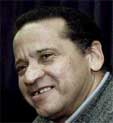|

Another
Death Row Mistake
January
5
 AT
HIS TRIAL in Florida in 1984 for the murder of one Delbert Baker, Juan
Roberto Melendez sought to argue that another man, Vernon James, had
committed the crime. But when Mr. James was called to testify, he took the
Fifth Amendment, and Mr. Melendez was convicted and sentenced to death.
Seventeen years later, facing a mountain of new evidence that all seems to
bolster Mr. Melendez's trial defense, Florida Circuit Judge Barbara
Fleischer threw out Mr. Melendez's conviction. Exculpatory evidence had
been withheld, she wrote, and the cumulative effects of new evidence
"combine to undermine the confidence in the outcome of Defendant's
original trial" and create "a reasonable probability of a
different outcome." This week, prosecutors decided to drop the case
and Mr. Melendez went free. AT
HIS TRIAL in Florida in 1984 for the murder of one Delbert Baker, Juan
Roberto Melendez sought to argue that another man, Vernon James, had
committed the crime. But when Mr. James was called to testify, he took the
Fifth Amendment, and Mr. Melendez was convicted and sentenced to death.
Seventeen years later, facing a mountain of new evidence that all seems to
bolster Mr. Melendez's trial defense, Florida Circuit Judge Barbara
Fleischer threw out Mr. Melendez's conviction. Exculpatory evidence had
been withheld, she wrote, and the cumulative effects of new evidence
"combine to undermine the confidence in the outcome of Defendant's
original trial" and create "a reasonable probability of a
different outcome." This week, prosecutors decided to drop the case
and Mr. Melendez went free.
The
evidence against Mr. Melendez was never strong. He was convicted on the
strength of two witnesses -- one of whom professed peripheral involvement
in the killing and the other of whom claimed Mr. Melendez had confessed to
him. As far back as 1986, one judge of the Florida Supreme Court objected
to his death sentence, saying "I do not . . . believe that the quality
of [the] evidence is sufficient to support imposition of the death
penalty." But Mr. Melendez remained on death row, and until 2000, his
appeals were going nowhere. He could easily have been executed.
 The
break in the case came only in 2000, when it came to light that Mr.
Melendez's trial attorneys had possessed a taped interview with the
now-deceased Mr. James in which, as Judge Fleischer put it, "Vernon
James said that Juan Melendez was not present when [the victim] was killed."
Numerous other witnesses have also been located, and their statements
"tend to corroborate that Vernon James was present and that Juan
Melendez was not." Meanwhile, serious questions have been raised about
the two witnesses who implicated Mr. Melendez. Their prior statements,
withheld from the defense, contradicted their testimony at trial on
numerous points. The
break in the case came only in 2000, when it came to light that Mr.
Melendez's trial attorneys had possessed a taped interview with the
now-deceased Mr. James in which, as Judge Fleischer put it, "Vernon
James said that Juan Melendez was not present when [the victim] was killed."
Numerous other witnesses have also been located, and their statements
"tend to corroborate that Vernon James was present and that Juan
Melendez was not." Meanwhile, serious questions have been raised about
the two witnesses who implicated Mr. Melendez. Their prior statements,
withheld from the defense, contradicted their testimony at trial on
numerous points.
According
to the Death Penalty Information Center, Mr. Melendez is the 99th death row
inmate to be freed since the modern era of capital punishment began in this
country. In that time, there have been around 750 executions -- meaning
that an unnervingly large number of capital convictions are ultimately
shown to involve the gravest of errors. How many times, one must wonder,
have such errors gone undiscovered? Particularly now, with states racing
convicts from the courtroom to the death chamber, nobody can say with any
confidence that all of the people executed in America have been guilty. It
is long past time to do away with a punishment that serves no useful
purpose and the erroneous application of which will eventually -- if it
hasn't already -- implicate government in the killing of innocent people.
|

